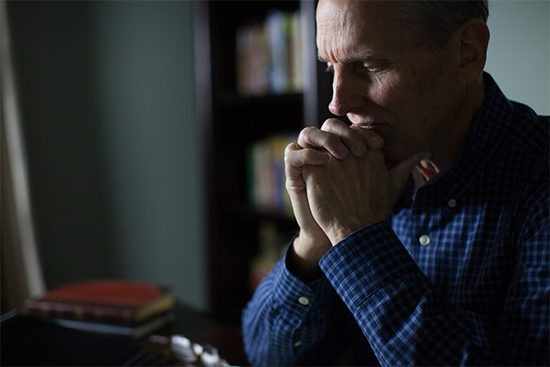
October-
November 2018
Moving Forward
------------------
|






"My Tears have been my meat day and night, while they continually say unto me, where is thy God? (Psalm 42:3)
Tracks of My Tears
By Gene Kissinger
“My tears have been my meat day and night,
while they continually say unto me, where is thy God?” (Psalms 42:3)
I wept when I told my board. I wept when I told my church. I wept when I told my family. After 27 years as pastor of the same church, I found I could no longer do the things needed to lead a growing church successfully. I had experienced a profound and prolonged depression, accompanied by serious panic attacks. I had reached the point of waiting in the parking lot until time to start church then entering quickly, stumbling through a sermon, and leaving as soon as possible.
The old maxim declares, “A going pastor builds a coming church,” but visitation was out of the question. I simply couldn’t handle another problem. I grew distant from my church family and from own family. The church, once vibrant and growing, began struggling and shrinking, and it was my fault.
I described the situation in my resignation letter:
Ministry is hard, arduous work. It can put a profound strain on a pastor’s marriage and on his children. Several years ago, my wife entered a doctor’s care for depression and anxiety, and recently, I also entered a doctor’s care for depression and anxiety. I have experienced panic attacks and chest pains so severe I thought they were heart attacks. I have been having these panic attacks on a weekly basis, and the chest pains are a regular part of my life. My doctor assures me they are not heart attacks but stress related. I am saddened to find myself unable to carry my own load of stress, much less the heavy load that a pastor must carry to be effective in his calling. So, it is with a heavy heart that I tender my resignation as pastor of this amazing church that has been so kind to my family and me these last three decades.
Why am I sharing my story? I think others might relate—other pastors and pastors’ families who also struggle with depression and anxiety. Could they find help and a happier ending to their story? Is there hope for them? I believe so.
A Difficult Admission
My biggest problem was admitting I even had a problem. The depression came on gradually, not instantly. It was both genetic and situational, the result of ministry pressures, a large family, and all the pressures that accompany them. I experienced more than two years of depression before I finally recognized what it was and another year before I sought medical help. And I am not alone.
“Depression doesn’t always look like debilitating sadness,” says Richard Kravitz, MD, a professor of internal medicine at University of California. “Patients are reluctant to consider depression as a cause of their symptoms. In part because they may equate it with weakness, but also in part because they simply don’t associate those symptoms with depression.”
The site lists ten somewhat surprising symptoms of depression: unexplainable pain, weight gain, short temper, lack of emotion, addictive behavior, heightened social media activity, distraction, indecision, a drop in personal hygiene, and sleep disorders.

Even after recognizing and admitting the presence of depression, getting help is a real struggle. During my struggle, I read a quote from Marilyn Meberg that helped me confront my situation: “Secrecy is to sickness what openness is to wholeness.” The only way to heal was to shine some much-needed light on my plight. I have learned that many in ministry struggle with “the black dog” of depression as Winston Churchill described it. Even pulpit legends like Spurgeon suffered bouts of depression, as did Jeremiah, David, Elijah, and John
the Baptist.
Had I recognized and received help sooner, perhaps I would have had a better outcome and maybe even stayed in the pastorate. Why do we hesitate to get help?
-
We don't want to admit weakness. (This is not biblical. Scripture teaches we are weak, and our strength comes from God.)
-
We fear judgment, especially from preacher friends and church leaders.
-
We have mistaken beliefs about depression and other mental health issues. Depression does not equate with emaciated spirituality.
-
We worry an admission will affect future ministry opportunities.
Steps to Recovery
Six months into my new life I am doing much better. I am not healed, but I am healing. I followed these steps to begin the healing process:
-
I sought medical help. A doctor has addressed my physiological symptoms. Thanks to medication, I now sleep well. Before, I was fortunate to get four good hours of sleep a night.
-
I told my story. Not only has it helped me to tell my story, I have learned it has the power to bring help and hope to others. People are often shocked and tell me I didn’t look depressed. This is a good reminder depression has no special “look.” We have no idea how many people around us are struggling.
-
I enlisted the help of close friends and family. All I had to do was ask, and they were there.
-
I memorize and meditate on Scripture. Robert Morgan’s book 100 Bible Verses Everyone Should Know by Heart is a good place to start.
-
I am building balance. Imbalance in my life was my besetting sin. I thought I would rather burn out than rust out. Today, I understand God would rather I avoid both extremes.
-
I gave myself a demotion. I promoted God back to His rightful place and gave up the illusion of control. We “play god” when we try to control everything and everyone in our lives in an attempt to remove pain (or maintain pleasure) in our lives. Trouble is, we are truly terrible at trying to do God’s job. He alone has the knowledge to understand what should happen and the power to bring it to pass.
Take Sabbath Seriously
I am convinced those in ministry break this important commandment more than any other profession. I worked bi-vocationally most of ministry life, which meant weekends were filled to the brim with ministry. I almost never took time off. This was sinful. We need to divert daily to unwind. Find a hobby, read a book, or learn a musical instrument—something to provide relaxation in your life. Then withdraw weekly to get away from ministry demands. Monday is a good choice, but find the day that works best for you and your family. Finally, abandon annually. Take vacations or a “stay-cation” to unplug completely. Leave texts, calls, Internet, and instant messages behind.
Churches, you have a wonderful opportunity by arranging a sabbatical season for those who have been in the pastorate for many years. Charles Spurgeon began taking occasional sabbaticals late in his ministry, and I can’t help but wonder if he might have lived and ministered longer if he had started this earlier.
Overcoming the Main Objection
I can almost hear the skepticism. “Won’t this slow down my church growth?” “How will I ever get things done?”
Let me offer some simple encouragement and advice: you are more than the ministry you do. God’s love for you is not based upon what you accomplish. Stop trying to earn something you already have in full measure. And, let me also call upon the ancient wisdom offered by the tortoise and the hare: slow and steady always win the race. Jesus never ran anywhere in Scripture. It wasn’t that he didn’t care; instead, he was demonstrating the pace of grace. It’s time to stop our frenetic pace and return to the rhythm of resting in God.
I am convinced God desires slow, consistent growth rather than a quick and exhausting dash that disappears quickly and leaves few results. Stop trying to accomplish a decade’s worth of work in a year, and remember God thinks generationally. For Him, a thousand years are as a day. Take the long view, and let Him take your small, steady efforts and multiply them as only He can.
Remember the promises of Scripture:
“Who is among you that feareth the LORD, that obeyeth the voice of his servant, that walketh in darkness, and hath no light? let him trust in the name of the LORD, and stay upon his God”
(Isaiah 50:10).
About the Writer: Rev. Gene Kissinger pastored at Jerome
FWB Church (ID) for 25 years. He and his wife Sandy are the parents of seven.
Struggling with depression?
Here is help:
Focus on the family crisis line:
855-771-HELP (4357)
Mon - Fri: 6am - 8pm (Mountain Time)
Focus on the family pastoral care:
877-233-4455
Mon - Fri: 6am - 8pm (Mountain Time)
pastors@fotf.org
|
|

